The crowd mills forward as the dog's owner stops abruptly on the lawns of Old Parliament House.
"I'd normally pick it up, but this one's for Scomo!" he tells chuckling passers-by, sidestepping the mess.
Stand still for a few minutes and you'll hear complaints about the traffic getting into Canberra, frustration at police - "They work for us" - and sincere debates over the correct punishment for the "evil" Dr Fauci.
Analysts are increasingly concerned a seemingly disparate movement, which descended on Canberra this week, is becoming a hunting ground for far-right recruiters.
There is a food donation stall, a Welcome to Country message, reminders to clean up your rubbish, and signs delighting in the idea of violence against the media.
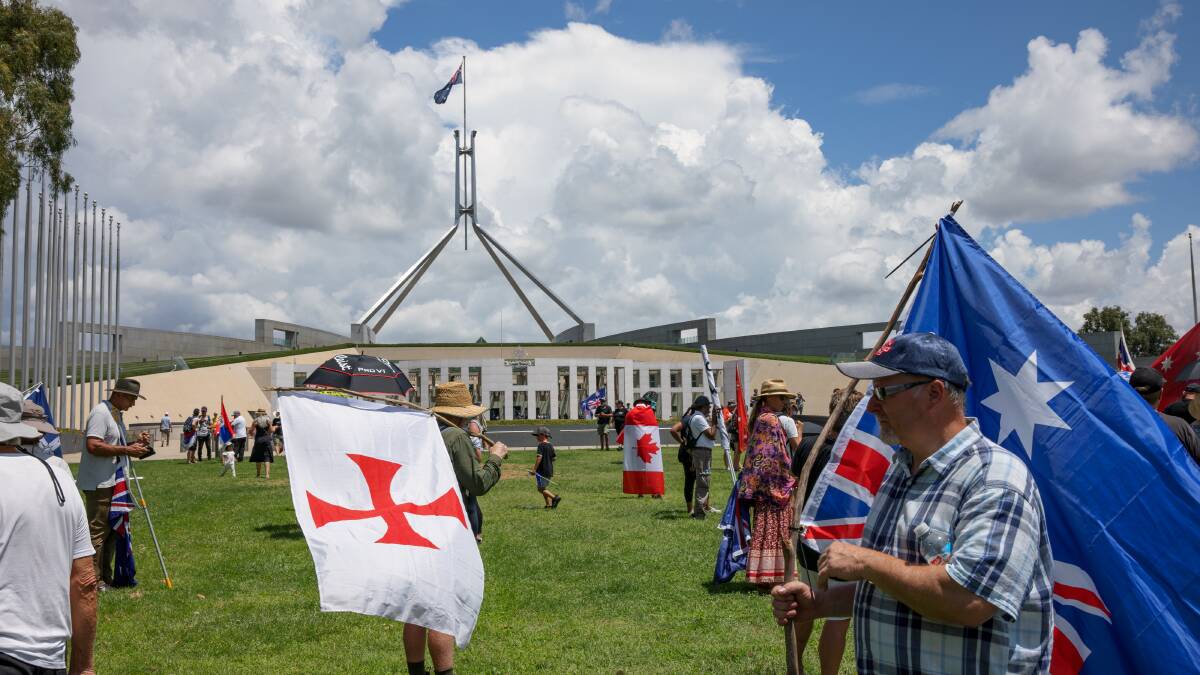
A boy, no older than 10, thrusts books into nearby hands at the behest of his father. 'Between Christ and Satan', the front-cover reads.
There are Serbian flags - a nod to Novak Djokovic - Aboriginal flags, Trump 2020 flags, Eureka flags, and LGBT flags bobbing above the crowd.
Another, a small red cross against a white backdrop, reveals a more sinister presence lurking in the capital.
But the influence of right-wing extremists within the movement is complex and, perhaps deliberately, vague.
'On their radar'
Deakin University expert Josh Roose says extremists are "cloaking themselves in the momentum of the anti-vaxers", who they hope to convert into a grassroots movement.
Far-right activists use anti-establishment sentiment to establish a connection, before gradually introducing more extreme ideology.
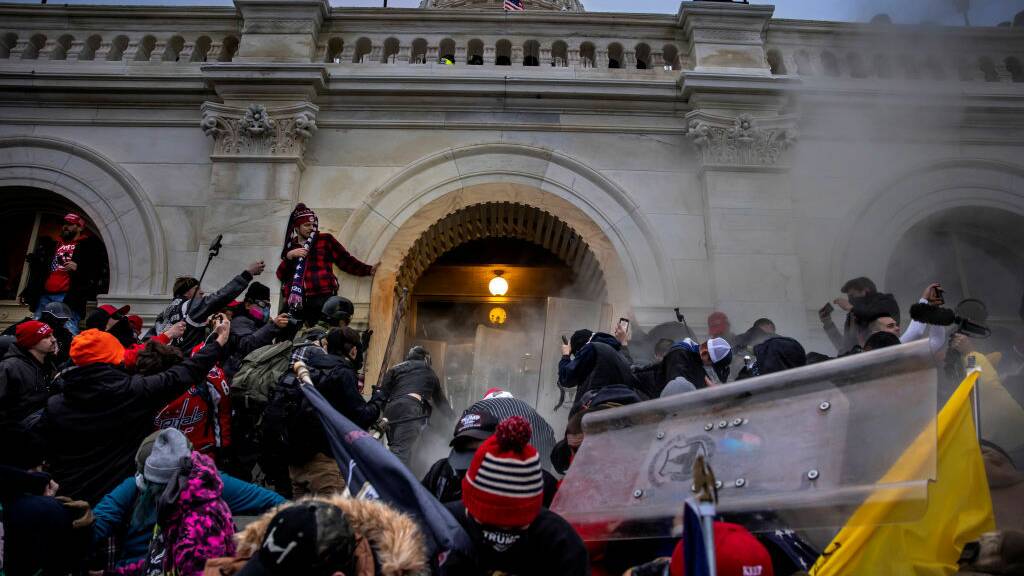
One minute, you're talking about vaccine mandates. The next, the need for a white-ethnostate.
"They call it 'bread crumbing' ... There's an attempt to steer the trajectory of the movement," Roose says.
Roose describes the Australian far-right as fluid, but increasingly influenced by overseas, with the January 6 Capitol Hill insurrection a "big thing in [their] mythology".
"It's a really important symbol for them. You had a far-right populist president talking about draining the swamp, and by the end of that presidency they found themselves walking the halls of the Capitol," Roose says.
The Capitol Hill attack was driven by a messy coalition of far-right extremists, COVID-19 conspiracy theorists, and Trump supporters whipped into a frenzy by the former US president.
While similar attacks are "absolutely on [Australian extremists'] radar", Roose says they remain unlikely without politicians "calling for and seeking to mobilise them" as they did in the US.

Their short-term fixation is gaining the balance of power via populist right-wing politicians, aided by a number of MPs already "echoing [anti-vax] movements at a political level", he warns.
"You've seen these groups go from being a laughing stock that didn't have any presence whatsoever in the wider community a couple of years ago ... to the point that they've now got a major voice in the Australian Parliament," he says.
"The positive momentum that indicates, and the potential future for that, is really dangerous for democracy in this country."
'Keyboard warriors'
The Capitol Hill rioters, some calling for the execution of former vice president Mike Pence, made it within metres of lawmakers.
And with protestors in Canberra warning they will remain for the sitting fortnight, beginning on Monday, security around Parliament House has been significantly beefed-up.
Police are now checking IDs at the one road into the building - the rest have been closed - with security pouncing on anyone walking the halls without their pass visible.
The tension is part of what Roose describes as a "transnational phenomenon" which has mainstreamed threats to public figures.
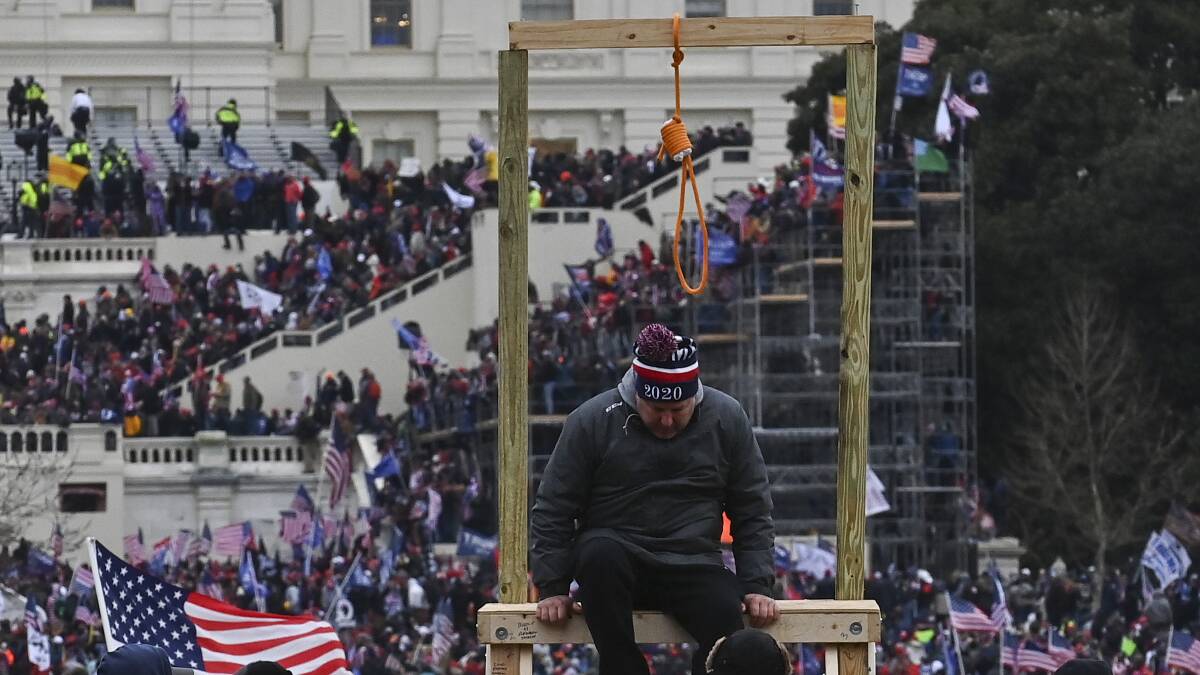
The rhetoric of the Australian far-right - and the COVID protests more generally - is also narrowing in on politicians and the media.
"You've got to ask yourself the question: if Dan Andrews was to walk into the middle of one of these rallies ... would he walk out of there in one piece?" Roose asks.
Wading through thousands of online threats to assess which could signpost real-world violence is a complex task, made more difficult by far-right extremists couching their language in irony - or "shitposting".
An Australian terrorist who murdered 51 Muslims in Christchurch in 2019 was active on far-right online forums, where his posts seemed indistinguishable from the rest of the pack.
"They may fall through either legislative and jurisdictional cracks, or may just not be taken seriously and seen as keyboard warriors," Roose says.
While the majority will remain non-violent, Roose warns there are "legitimate concerns" about individuals lurking on the fringes and "looking for an opportunity to act".
"To assume there's not at least a handful [across Australia] with that capacity would be irresponsible," he says.
'Ideological glue'
One presence prominent at Capitol Hill was the Proud Boys, a international group espousing "western chauvinism" and listed as a domestic terror organisation in Canada.
A Canberra-based chapter - the Proud Boys Southern Tablelands - has seized on the pandemic, using a November COVID-19 freedom rally in Civic as a fundraiser.
Members were also present at this week's protests, flashing white power signs just metres from the doors of Parliament.
But their operations appear to include a handful of members involved in low-grade activity, including placing stickers on Braddon's rainbow roundabout and the ANU's Islamic Studies Centre.
And Katja Theodorakis, head of the Australian Strategic Policy Institute's counter-terrorism program, warns the idea of a unified far-right menace pulling the strings behind a national movement is simplistic.
The "overall character" of the protests is not far-right, she says, but made up of "loose alliances" which would have seemed bizarre before the pandemic.
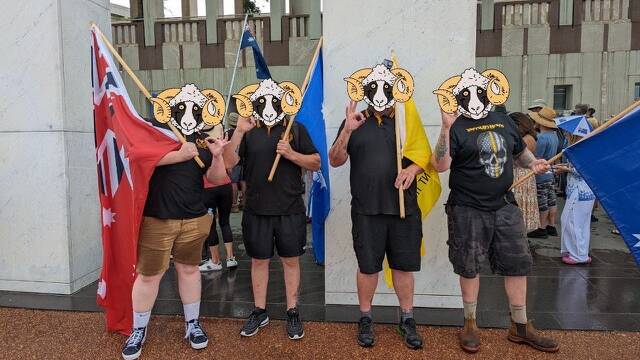
Non-white protestors outside Parliament carried the upside-down red ensign, a flag linked to a sovereign citizens movement which historically was "primarily white supremacist", Theodorakis says.
"The New World Order stuff has come in as the ideological glue that keeps it together, and smooths out some of those things that would normally be contradictions," she says.
"People don't have to subscribe to [far-right ideology] directly ... because racism or ethnic purity is not your overriding common denominator anymore. It's your anti-government, your conspiracy mindset."
'Change the climate'
In December, after the entrance of Old Parliament House was set alight, Aboriginal Tent Embassy leaders warned their protest movement had been "hijacked" by anti-vax activists. Adding to the murkiness, images of Proud Boy stickers plastered near the scene began circulating among members within days.
"It'd be in their interest to show support for the overall cause of the Aboriginal sovereign citizen movement, because that kind of loose alignment is not a threat to them," Theodorakis says.
"You don't need to all be in agreement. But if you just get enough people against the mainstream, you're reaching your goal of subverting mainstream society."
Australia's security agencies warn the pandemic is accelerating far-right activity, which now takes up roughly half of the country's counter-terror workload.
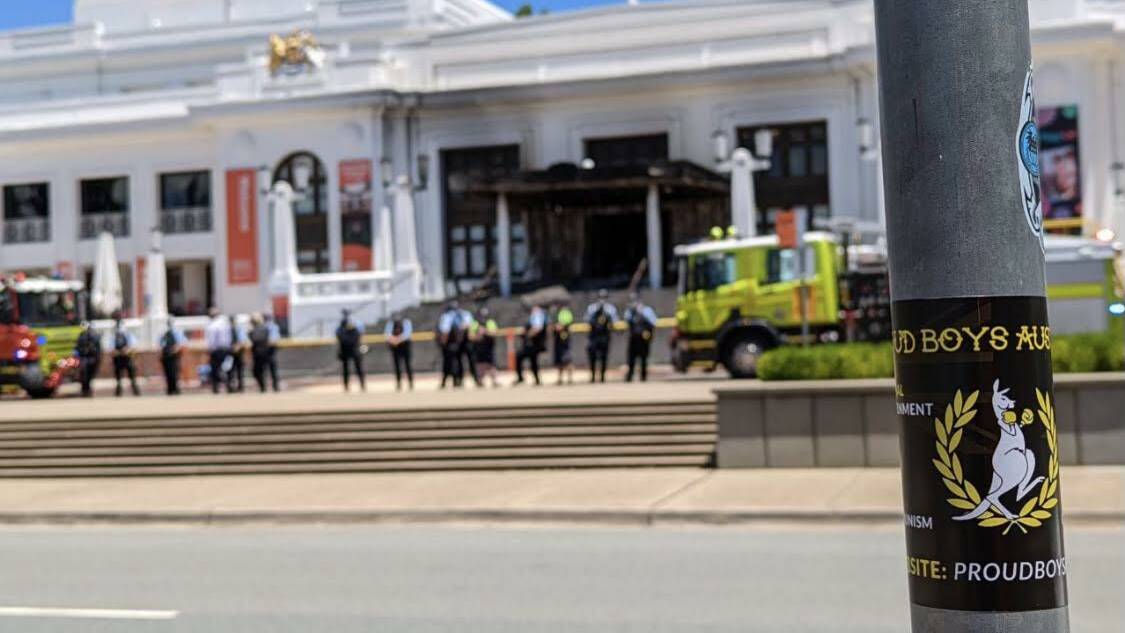
But Theodorakis says right-wing extremists are on a broad spectrum, ultimately aiming to overturn liberal democracy but at odds over the tactics and time needed to do so.
The Proud Boys may be acutely aware of their limitations in Australia and wary of overplaying their hand, but believe democracy is weak enough to doom itself.
"They'll do things to accelerate it, but they're not out there to overthrow the government in a violent coup to install a new Hitler. It's more subtle and long-term," Theodorakis says.
The group is one of many which seem to view shifting the Overton Window - the range of opinions deemed acceptable in public discourse - as their best bet, and alignment with overt neo-Nazis as "detrimental" to that cause.
"You don't have to be a big mastermind, you can do that by injecting comments into a group," Theodorakis says.
"You aim to change the climate and make it more favourable to your views, so it's quite acceptable to be racist, and it's quite acceptable to think the government is illegitimate.
"If you're wanting to gain members and become a bit of a force, it's no good if you land yourself in prison or get banned."







